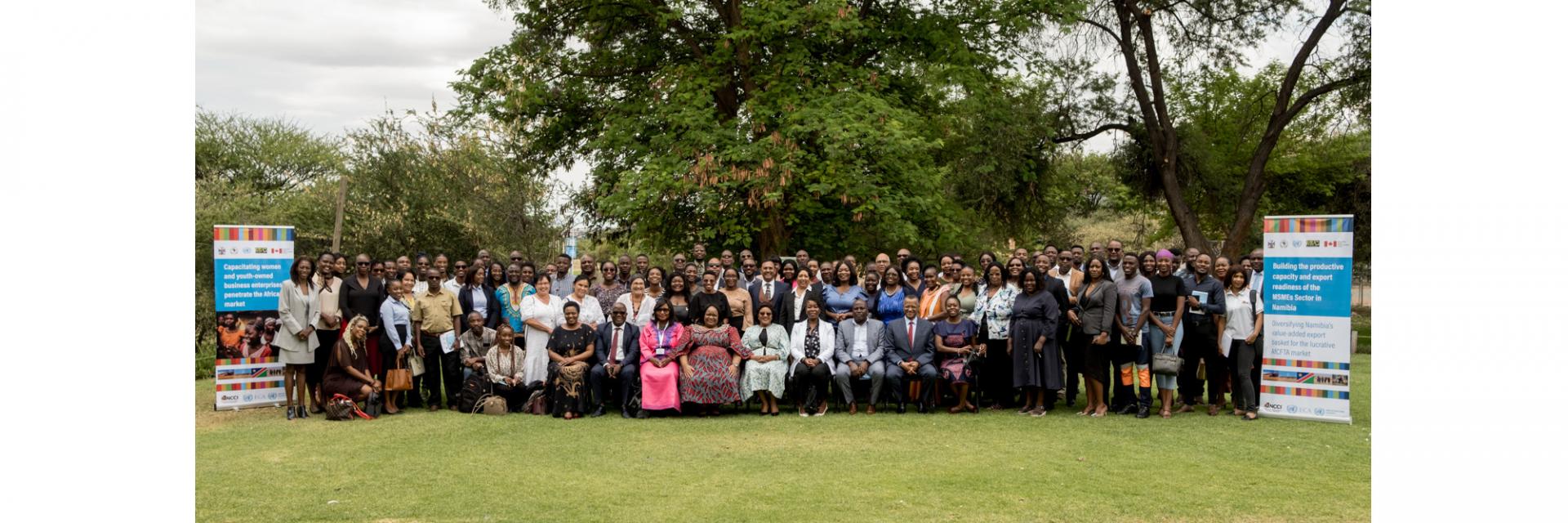Windhoek, Namibia, 21 November 2022 - The Namibian Government in collaboration with the Economic Commission for Africa (ECA) and the United Nations System in Namibia officially launched Namibia’s National Strategy and Implementation Plan for the Agreement Establishing the African Continental Free Trade Area (AfCFTA) for the period 2022-2027. The Agreement provides an opportunity for Namibia to increase its intra-African exports and enhance the country’s export-led manufacturing and services capabilities.
The Minister of Industrialisation and Trade, Hon. Lucia Iipumbu, during her keynote address, reminded participants of the progress that Namibia has made since the adoption of the AfCFTA Agreement on March 21, 2018 during the 18th Extraordinary Session of the Assembly of African Union Heads of State and Governments in Kigali, Rwanda. The instrument entered into force on 30 May 2019, and trade commenced in January 2021.
Hon. Iipumbu said “the overarching objective behind the AfCFTA is the elimination or reduction of tariff and non-tariff barriers amongst the 55 Countries. The Agreement is aimed at integrating Africa’s markets by creating a single continental market for goods and services, with free movement of persons and investments”.
The participants were welcomed by United Nations Resident Coordinator, Mr. Seng Pang, in a statement read on his behalf by Senior Economist, Ms. Eunice Ajambo, who elaborated on UN support in Namibia on the AfCFTA through awareness campaigns at the national and sub-national levels; support to Micro, Small and Medium enterprises (MSMEs) led by women and youth in key border areas and commissioning of a market intelligence study on domestic and external market access for domestically produced commodities under the leadership of the Namibia Trade Forum.
The Director for Sub-Regional Office for Southern Africa (ECA SRO-SA) Ms. Eunice G. Kamwendo gave a regional perspective of ECA support to Namibia in a statement delivered on her behalf by Ms. Olayinka Bandele, Chief, Inclusive Industrialization who also recognised the key role of MSMEs, including women and youth-owned businesses in anchoring export development and growth in Namibia.. She noted that, “by signing the AfCFTA Agreement, Namibia has unlocked access to a market of 1.3 billion people, providing opportunities for local entrepreneurs and to optimize these benefits there is need for the country to address issues pertaining to the removal of tariffs and non-tariff barriers”.
Meanwhile, Coordinator for ’ECA's African Trade Policy Centre (ATPC), Mr. Melaku Desta, emphasised that the AfCFTA provides the solution to Africa’s excessive dependency on imports for essential products, such as pharmaceuticals and food, while exporting primary commodities. Mr. Desta suggested that Africa should explore how it can use the AfCFTA as a platform to implement the AU commodity strategy, add value before exporting, and retain a share of the resource rent within Africa. “This is also the only way we can move ourselves up the global value chain. We cannot afford to continue to sit at the bottom of value chains, extracting and exporting raw mineral ores or sending out primary agricultural products.” Mr. Desta concluded by congratulating Namibia for the high quality AfCFTA national strategy and promised ECA’s continued support in this field”.
Chief Executive Officer for the Namibia Chamber of Commerce and Industry, Ms. Charity Mwiya added that the Private Sector’s concern is the capacity to compete in continental markets. Women find it challenging to compete in in formal markets. AfCFTA offers hope in building back together, this is a key instrument for building back together, to ensure resilience and drive growth.
The Business community stands to benefit from the launch of the national strategy which is a product of extensive consultations with stakeholders, she added, noting that the effective implementation of the strategy will require all partners and the private sector to pool resources together and critically analyse how women, youth, and grassroots organisations can be in the forefront. Mwiya commended the MIT for taking the sensitization campaigns to the grass roots. She called on the private sector to participate fully and embrace the initiative and “play to win”.
Executive Director for the MIT, Mr. Sikongo Haihambo noted the overall objective of the launch of the Implementation Strategy was to make it publicly available for implementation by stakeholders particularly the private sector and members of the business community to actively get involved and take advantage of the opportunities provided by AfCFTA. The Launch will provide an opportunity to Namibian stakeholders to appreciate the collective strategies towards extracting optimal benefits from the larger continental markets.
The meeting closed with a call by the Deputy Minister for MIT, Hon. Verna Sinimbo for Africa to trade among ourselves and change perceptions of dependency on foreign markets.

